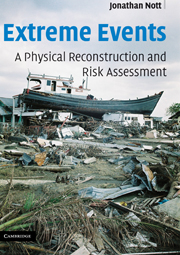3 - Floods
Published online by Cambridge University Press: 18 December 2009
Summary
Floods occur when water from terrestrial run-off leaves a stream channel and spreads across the surrounding landscape. The definition of a flood can take on different meanings to different people. Many would consider flooding to occur only when the level of water has risen to a point where the threat to property and infrastructure is unavoidable (Bell, 1999; Chapman, 1999; Smith, 2001; Bryant, 2005). In this sense flooding is viewed as a hazard. Floods are also the maintainers of ecosystems and support life in coastal estuaries, lakes, wetlands and enrich vast floodplains and play an integral role in the geomorphic evolution of landscapes (Jones, 2002). Flooding is a natural function of river behaviour and floodplains by definition are innately flood-prone (Chapman, 1999).
Causes of floods
The causes of floods can be broadly divided into physical, such as climatological forces, and human influences such as vegetation clearing and urban development. The latter can result in an exacerbation of the conditions affecting the run-off of water resulting in flood intensification (Smith, 2001). The most common causes of floods are intense and/or prolonged storm precipitation, rainfall over areas of snow cover, rapid snow melt, the successive occurrence of medium to major size storms and the failure of dams, including ice dams (Chapman, 1999). The most important causes of floods are atmospheric hazards, most notably rainfall. Floods can also be associated with oceanic and atmospheric processes on a large scale such as the El Niño Southern Oscillation (ENSO) phenomenon.
- Type
- Chapter
- Information
- Extreme EventsA Physical Reconstruction and Risk Assessment, pp. 51 - 76Publisher: Cambridge University PressPrint publication year: 2006
- 1
- Cited by



